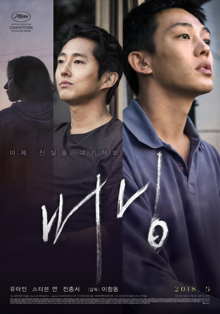
Director Lee Chang-dong films have been very hit and miss for us. This was particularly anticipated since it was his first film in eight years since Poetry which we did like. It was also adapted from a short story by Haruki Murakami. Unfortunately once again this one left me with mixed feelings as the story went in a direction different from what I expected and I’m not sure what to think about that.
Lee Jong-su aspires to be a writer but does odd jobs for a living and lives in his father’s farmhouse in a rural area. One day he runs into Shin Hae-mi, a childhood friend from his home town, but fails to recognize her. They reconnect and Hae-mi asks him to take care of her cat at her house while she is away travelling in Africa. They have sex before she leaves and after that he does indeed return to the room to feed the cat though he never sees it. When she returns however, she is accompanied by another Korean man, Ben, who she met during the trip. Jong-su is unsure of where he stands with Hae-mi though he has certainly developed feelings for her and he feels inadequate next to Ben, who is wealthy and confident. During a visit by Hae-mi and Ben at Jong-su’s farmhouse, Ben confesses to having a bizarre hobby of burning down abandoned greenhouses. He claims that he is going to burn one very soon and very nearby. Jong-su is intrigued and looks out for such a burning but notices nothing amiss. Meanwhile Hae-mi disappears without a trace.
This film combines beautiful cinematography, solid performances and a distinctly artistic sensibility. The characters are each well crafted and interesting. It’s great how subtly the director handles Ben as a low-key antagonist as he genuinely comes across as a decent guy and doesn’t throw around his wealth like a club. Newcomer actress Jeon Jong-seo is fantastic as the completely free-spirited and uninhibited Hae-mi. I love the choice of locations as well, with the glamorous Gangnam district that Ben lives in contrasting with the rustic quality of Jong-su’s farmhouse located so close to the border with North Korea that they can hear the propaganda messages being broadcast. There’s so much in play in the first half of the film, such as whether the cat that Jong-su has never seen truly exists, his uncertainty with regards to his relationship with Hae-mi, the sub-plots about a father whose temper has gotten in trouble and a mother who is missing and so on.
Yet to me this is a case of the whole being lesser than its parts as I don’t feel that the disparate pieces mesh well into a coherent theme. While there is some ambiguity over the course of the film, by its end there seems to be little doubt as to what actually happened and there’s only one way to read the film and my emotional reaction to that is distinctly meh. The revelation that it brings of what Ben is and what he does just isn’t that interesting to me. The only redeeming quality might be in how Ben keeps asking Jong-su if he has found something to write about and the implication is that he wants Jong-su to write the story of Ben’s proclivities. Meanwhile the film loses much of its energy once Hae-mi exits the scene and the tone is distinctly different as well. I feel sort of cheated that Hae-mi’s character development just gets interrupted like that. I also didn’t like how the subplots about Jong-su’s parents turn out to be more or less irrelevant.
Most critics seem to have liked this film and really watching this is a great experience as it’s so well crafted. But it’s also the kind of film that makes you feel more frustrated the more you think about it because of all of the alternate paths it could have travelled and the different choices it could have made to create a more coherent theme.